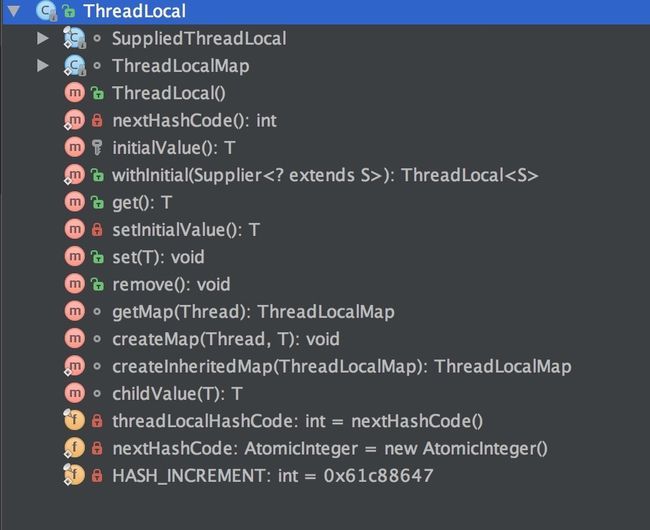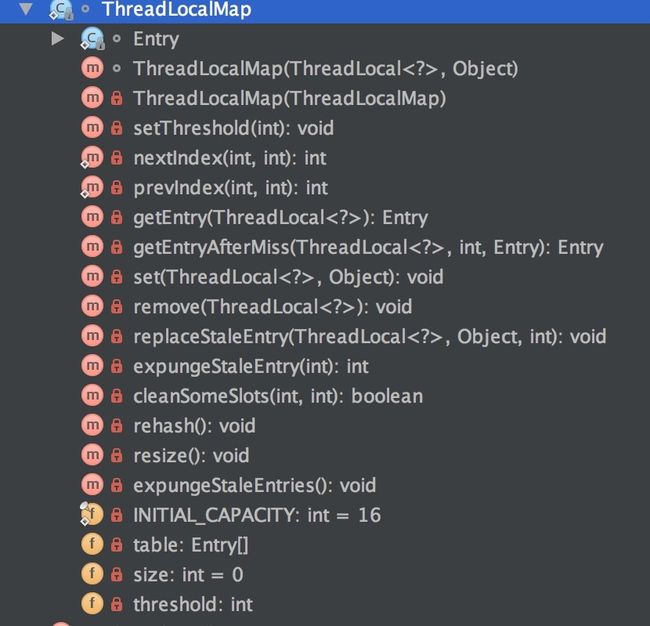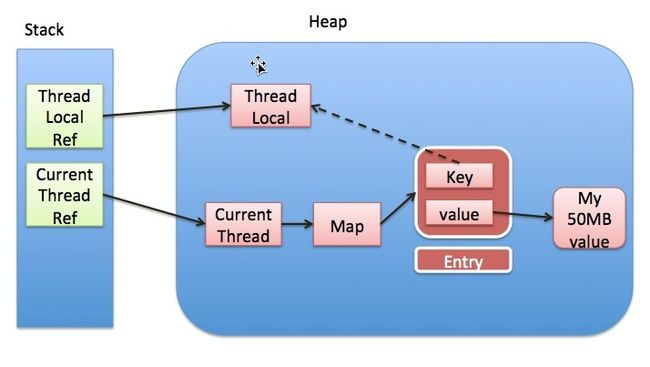源码分析之ThreadLocal
概念描述
ThreadLocal的作用是提供了线程内的局部变量。当使用ThreadLocal变量在多线程环境下,每个线程提供独立的变量副本,所以每一个线程都可以独立地改变自己的副本,而不会影响其它线程所对应的副本。
JDK API 描述:
/**
* This class provides thread-local variables. These variables differ from
* their normal counterparts in that each thread that accesses one (via its
* {@code get} or {@code set} method) has its own, independently initialized
* copy of the variable. {@code ThreadLocal} instances are typically private
* static fields in classes that wish to associate state with a thread (e.g.,
* a user ID or Transaction ID).
*/
尝试翻译下:
ThreadLocal提供一个线程局部变量。这些变量区别于线程内其他普通变量的地方是:访问变量的每个线程(通过get或set方法)都有自身独有的变量初始化副本。实例通常是用private static修饰为私有静态对象。希望将状态与某一个线程(例如,用户 ID 或事务 ID)相关联。
ThreadLocal VS synchronized
ThreadLocal并不是一个线程,而是一个线程局部变量。功能就是为每个使用变量的线程提供一个变量副本,每个线程可以独立修改变量副本,不与其他线程相互冲突,保证线程隔离。
synchronized关键字利用JVM锁机制保证临界区或者变量访问的原子性。同步机制中保证同一时间只有一个线程可以访问变量,从而实现资源共享。
同步机制采用的是以时间换空间方式,提供一个变量,多线程环境下各个线程通过阻塞排队访问。ThreadLocal则以空间换时间方式,多线程环境,每个线程访问自己独有的变量副本,同时访问,相互隔离。
ThreadLocal源码分析
ThreadLocal类结构大致如下:
主要看看经常使用的其中的get()、set()、remove()方法。
静态内部类ThreadLocalMap
在看具体方法的前,先看看ThreadLocal中的静态内部类ThreadLocalMap,这个Map为每个线程复制一个变量副本存储其中。类接口如下:
这里的Entry是WeakReference的子类,Entry的key是弱引用,指向ThreadLocal。当ThreadLocal实例被设置成null时,ThreadLocal就会GC回收。这样就会存在key为null的entry。而此时value。这些key为null的entry的value就会一直存在一条从当前线程连接过来的强引用:
Thread Ref -> Thread -> ThreaLocalMap -> Entry -> value。
只有线程结束的时候,value才会被回收。在使用线程池的时候,线程放回线程池一直不被使用或者使用没有调用ThreadLocal的get()、set()、remove(),就会造成内存泄露。所以为了避免内存泄漏,每次使用完 ThreadLocal ,都调用它的remove()方法,清除数据。
从源码可以看出线程是用Entry来保存ThreadLocal提供的变量副本。而Entry的key是将其Hashcode与数组长度-1进行与操作:key.threadLocalHashCode & (table.length - 1)。 还可以看到有个HASH_INCREMENT,它是一个常量:0x61c88647。ThreadLocalMap的长度被要求为2的N次方,选定这个值,是因为可以让hash的结果在2的N次方内尽可能均匀分布,减少冲突的概率。
ThreadLocalMap解决冲突的方法是开放地址法,所谓的开放地址法是指,发生Hash冲突后,按照某种方法继续探测哈希表中的其他存储单元,直到找到空位置为止。
get()方法
get()方法返回线程局部变量的当前线程的变量副本值。
/**
* Returns the value in the current thread's copy of this
* thread-local variable. If the variable has no value for the
* current thread, it is first initialized to the value returned
* by an invocation of the {@link #initialValue} method.
*
* @return the current thread's value of this thread-local
*/
public T get() {
Thread t = Thread.currentThread();
ThreadLocalMap map = getMap(t); // 获取线程的ThreadLocalMap
if (map != null) {
ThreadLocalMap.Entry e = map.getEntry(this);
if (e != null) {
@SuppressWarnings("unchecked")
T result = (T)e.value;
return result;
}
}
return setInitialValue();
}
调用ThreadLocal.get()方法获取变量时,首先获取当前线程引用,以此为key去获取相应的ThreadLocalMap,如果Map不存在则初始化一个,否则返回其中的变量。
在Thread类中:
/* ThreadLocal values pertaining to this thread. This map is maintained
* by the ThreadLocal class. */
ThreadLocal.ThreadLocalMap threadLocals = null;
/*
* InheritableThreadLocal values pertaining to this thread. This map is
* maintained by the InheritableThreadLocal class.
*/
ThreadLocal.ThreadLocalMap inheritableThreadLocals = null;
每个线程都包含了两个ThreadLocalMap对象的引用。每个线程访问ThreadLocal变量都是访问其存在ThreadLocalMap自身为key的value值。
set()方法
set()方法作用是设置此线程局部变量的当前变量副本的值。
/**
* Sets the current thread's copy of this thread-local variable
* to the specified value. Most subclasses will have no need to
* override this method, relying solely on the {@link #initialValue}
* method to set the values of thread-locals.
*
* @param value the value to be stored in the current thread's copy of
* this thread-local.
*/
public void set(T value) {
Thread t = Thread.currentThread();
ThreadLocalMap map = getMap(t);
if (map != null)
map.set(this, value);
else
createMap(t, value);
}
获取当前线程的引用,首先获取当前线程引用,以此为key去获取相应的ThreadLocalMap。如果map存在,更新value,否则创建并存储该value。
remove()方法
/**
* Removes the current thread's value for this thread-local
* variable. If this thread-local variable is subsequently
* {@linkplain #get read} by the current thread, its value will be
* reinitialized by invoking its {@link #initialValue} method,
* unless its value is {@linkplain #set set} by the current thread
* in the interim. This may result in multiple invocations of the
* {@code initialValue} method in the current thread.
*
* @since 1.5
*/
public void remove() {
ThreadLocalMap m = getMap(Thread.currentThread());
if (m != null)
m.remove(this);
}
remove()方法比较简单,获取当前线程的ThreadLocalMap,然后移除map中的局部变量在当前线程的值。


